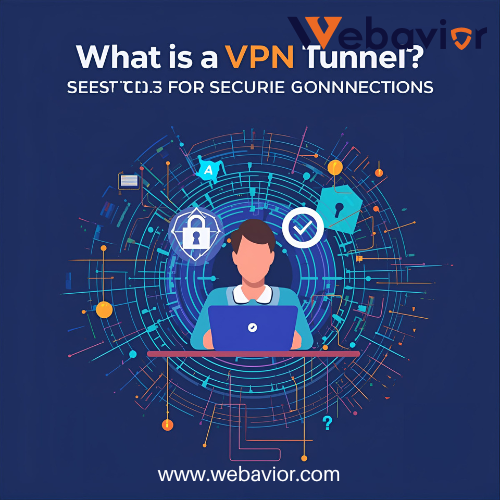Understanding Online Privacy| What is a VPN Tunnel and How It Protects You
October 24, 2025 | by IoT Development Company

In 2025, our lives are more connected than ever, with personal data constantly flowing across the internet. From online banking to social media, every click leaves a digital footprint that hackers, advertisers, or even governments can track. Protecting your online privacy is no longer optional—it’s essential. One powerful tool for safeguarding your data is a Virtual Private Network (VPN), and at its core lies a critical feature: the VPN tunnel. This article dives into what is a VPN tunnel and how it shields your online activities, empowering you to browse with confidence.
What is Online Privacy and Why It Matters
Online privacy entails the control that you have on the type of personal information that you share and the people who can access this information as you use the internet. Whenever you use the internet or email or even watch a television program, you are sharing information such as your IP address, your location, your browsing history among others. Unprotected, such data may be intercepted by hackers, used by advertisers to deliver targeting advertisements, or trailed by service providers (ISPs) and the government.
The dangers are there: each year, millions of records of users are exposed due to data breaches, public Wi-Fi access points are the favored location to conduct a hack, and the number of identity theft cases is growing. Allow me to use a good example, when you are in a cafe and use unsecured Wi-Fi, when a hacker can get your login credentials. Online privacy should be prioritized to keep your sensitive data such as bank details, passwords, or personal messages safe.
How Does a VPN Tunnel Work?
A VPN creates a secure connection between your device and the internet, and the VPN tunnel is the mechanism that makes this possible. So, what is a VPN tunnel? It’s a secure, encrypted pathway that your data travels through when you use a VPN. Think of it as a private tunnel on a busy digital highway, shielding your information from prying eyes.
Here’s how it works:
- Encryption: When you connect to a VPN, your data is encrypted, turning it into unreadable code. Common encryption standards, like AES-256, ensure even the most determined hackers can’t decipher it.
- Tunneling Protocols: The VPN tunnel is created using protocols like OpenVPN or WireGuard, which define how data is packaged and transmitted securely.
- VPN Server: Your data is routed through a VPN server, which masks your real IP address with one from the server’s location, hiding your identity and location.
This process ensures that your online activities—whether browsing, streaming, or emailing—are protected from interception.
How VPN Tunnels Protect Your Privacy
VPN tunnels are your first line of defense in securing your online presence. Here’s how they help:
- Data Encryption: Scrambling your data will ensure that no one including the hackers, the ISPs, or anyone else will be in a position to read it, including those who intercept it using a VPN tunnel.
- IP Address Masking: The tunnel conceals your actual IP address and it seems like you are browsing using the location of the VPN server. This makes your physical position and identity confidential.
- Safe Public Wi-Fi: Man-in-the-middle attack is susceptible to public Wi-Fi networks such as the ones found in airports or coffee shops. VPN tunnel will encrypt your connection and will keep your data safe.A VPN tunnel can be used to access web sites or other content that is blocked or prohibited in most regions that have limited access to the internet and at the same time keep your privacy intact.
- Avoiding Tracking: Commercial sites and advertisers monitor your activity in order to display some specific ads. This is minimized by a VPN tunnel that hides your activities.
For example, imagine you’re shopping online at a hotel. Without a VPN, your credit card details could be intercepted. With a VPN tunnel, your data is encrypted, ensuring a secure transaction. Also read How to Secure Your Remote Workforce with a VPN Gateway
Benefits of Using a VPN Tunnel
Using a VPN tunnel offers several practical advantages:
- Enhanced Security: Protects against cyber threats like hacking or phishing.
- Anonymity: Reduces tracking by websites, advertisers, or ISPs.
- Access to Geo-Restricted Content: Stream shows or access websites unavailable in your region.
- Peace of Mind: Browse, shop, or work remotely without worrying about data leaks.
- Multi-Device Support: Most VPNs work on laptops, phones, tablets, and even smart TVs.
Whether you’re a student, professional, or casual user, a VPN tunnel ensures your online activities remain private and secure.
Potential Limitations of VPN Tunnels
While VPN tunnels are powerful, they have some limitations:
- Speed Reduction: Encryption can slightly slow your internet connection, though modern protocols like WireGuard minimize this.
- Quality Varies: Not all VPNs are trustworthy. Some free VPNs may log your data or offer weak encryption.
- Legal Restrictions: In some countries, VPN usage may be regulated or restricted, so check local laws.
- Cost: Paid VPNs typically provide better security and performance than free ones, but they come with a subscription fee.
Choosing a reputable VPN provider mitigates most of these drawbacks.
How to Choose a VPN with a Reliable Tunnel
Selecting the right VPN is crucial for effective protection. Look for these features:
- Strong Encryption: Ensure the VPN uses secure protocols like OpenVPN or WireGuard and AES-256 encryption.
- No-Logs Policy: Choose a provider that doesn’t store your browsing data to guarantee privacy.
- Wide Server Network: More servers mean better speed and access to global content.
- Kill Switch: This feature cuts your internet if the VPN disconnects, preventing data leaks.
For beginners, research trusted providers with positive user reviews. Avoid free VPNs that may compromise your data or bombard you with ads. Check websites like CNET or TechRadar for up-to-date VPN recommendations. For more technical information visit Webavior.
Conclusion
Nowadays, it is paramount to understand what is meant by privacy and how to safeguard it in an online environment where the threat of online crimes is a constant. VPN tunnel is one of the pillars of using the internet with security, which encrypts your information and hides your identity to secure your safety. It is possible to browse, stream, and work confidently because you are sure of the security of your information by selecting a trustworthy VPN. The first action you should take is done today- research on good VPN services and consider online privacy as a priority.
RELATED POSTS
View all



